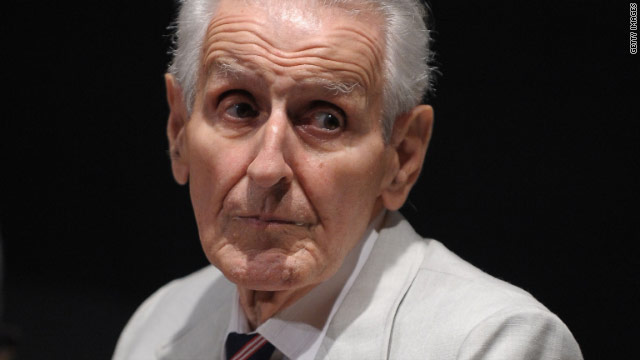Jack Kevorkian’s passing, regardless of your personal feelings, was a missed opportunity for us as a civilized society. He offered us the possibility of having an ethical/legal debate on the issue of euthanasia. I considered this a squandered moment in time. The problem remains unresolved. It is not a subject that will be solved easily or quickly; and remains hanging over us. if we ever arrive at the discussion there will be no one who has given it as much thought. The debate will begin from scratch.
Dr. Jack Kevorkian dead at 83 Dr. Jack Kevorkian, the Michigan pathologist who put assisted suicide on the world’s medical ethics stage, died early Friday, according to a spokesman with Beaumont Hospital. He was 83. The assisted-suicide advocate had been hospitalized in Michigan for pneumonia and a kidney-related ailment, his attorney Mayer Morganroth has said. The music of Johann Sebastian Bach, Kevorkian’s favorite musician, was put on the intercom so he could hear the music as he was dying, Morganroth said. The 83-year-old former pathologist had struggled with kidney problems for years and had checked into a hospital earlier this month for similar problems, his lawyer, Mayer Morganroth, told CNN last month. He checked back into Beaumont Hospital in the Detroit suburb of Royal Oak on May 18 after suffering a relapse, Morganroth said. Kevorkian, dubbed “Dr. Death,” made national headlines as a supporter of physician-assisted suicide and “right-to-die” legislation. He was charged with murder numerous times through the 1990s for helping terminally ill patients take their own lives. He was convicted on second-degree murder charges in 1999 stemming from the death of a patient who suffered from amyotrophic lateral sclerosis, commonly called Lou Gehrig’s disease. He was paroled in 2007. After his release, he said he would not help end any more lives. In an interview with CNN’s Dr. Sanjay Gupta last year, Kevorkian said he had no regrets about his work. “No, no. It’s your purpose (as a) physician. How can you regret helping a suffering patient?” he said. In that interview, Kevorkian said that he had three missions in life and that he himself was not ready to die. One of his missions was to warn mankind of “impending doom” that will come from the culture of overabundance. “I’m not going to be too popular for that one,” he said. His second mission was to educate people about assisted suicide, and his belief that in states where assisted suicide has been legalized, it is not being done right. He believed that people shouldn’t have to be terminal in order to qualify for help in ending their own lives. Kevorkian’s third stated mission was to convince Americans that their rights are being infringed upon by bans on everything from smoking to assisted suicide. In 2008, at the age of 79, he had a failed run for Congress in Michigan. Morganroth told the Detroit Free Press it appears Kevorkian suffered a pulmonary thrombosis when a blood clot from his leg broke free and lodged in his heart. With Kevorkian were his niece Ava Janus and Morganroth. “It was peaceful,” Morganroth told the paper. “He didn’t feel a thing.” |
